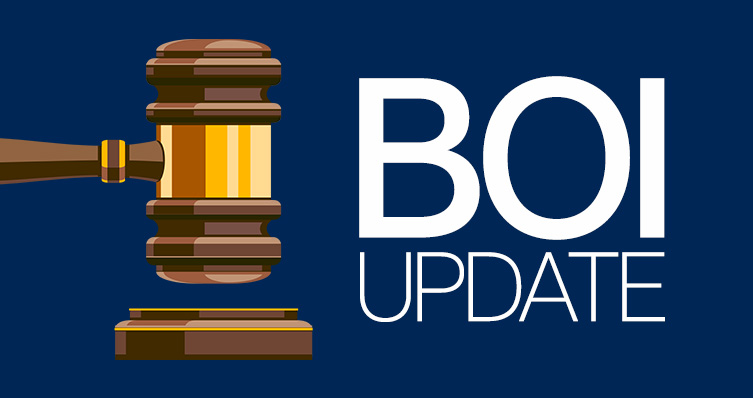
The DOJ seeks Supreme Court approval to enforce the Corporate Transparency Act, impacting BOI reporting for millions of U.S. businesses. Learn more here.
Background on the Corporate Transparency Act
The Corporate Transparency Act (CTA), enacted in 2021, aims to enhance anti-money laundering efforts by requiring reporting companies to disclose information about their beneficial owners. These requirements apply to corporations, limited liability companies, and other similar entities. Specifically, businesses must provide:
- Names of beneficial owners
- Dates of birth
- Addresses
- Government-issued identification numbers
For entities formed after January 1, 2024, the CTA also requires disclosing the identity of the “applicants” who filed for incorporation.
Failure to comply with these requirements can result in steep penalties, including fines of $591 per day (up to $10,000) and up to two years in prison. These stringent measures underscore the federal government’s commitment to preventing financial crimes, such as money laundering, tax fraud, and the financing of terrorism.
The Injunction and the DOJ’s Response
On December 3, 2024, a federal district court in Texas issued an injunction in Texas Top Cop Shop, Inc. v. Garland (No. 4:24-CV-478), preventing the government from enforcing the CTA’s BOI reporting requirements. This decision effectively paused the January 1, 2025, deadline for reporting companies to file BOI reports.
The DOJ quickly filed a notice of appeal and sought an expedited ruling from the Fifth Circuit. Initially, a panel of judges supported the DOJ’s position, stating that the government was likely to succeed in defending the CTA’s constitutionality. However, another panel reinstated the injunction just three days later, creating uncertainty for both the government and businesses.
In its emergency application to the Supreme Court, the DOJ argued that the injunction harms the government in multiple ways, including:
- Impeding Anti-Crime Efforts: The DOJ emphasized that the CTA’s reporting requirements are essential for detecting and prosecuting crimes such as money laundering and tax evasion.
- Undermining National Security: The inability to enforce the CTA hampers the U.S.’s ability to encourage other countries to strengthen their anti-money laundering frameworks.
- Disrupting Implementation: The injunction disrupts the ongoing rollout of the CTA, affecting over 32 million reporting companies.
Legal Justifications Presented by the DOJ
The DOJ’s application highlights key legal arguments in favor of the CTA:
- Constitutionality: The DOJ contends that the CTA’s reporting requirements fall well within Congress’s authority under the Commerce Clause. The anonymous operation of business entities has a substantial impact on interstate commerce, justifying federal regulation.
- Enumerated Powers: The DOJ argues that the CTA is necessary and proper to fulfill Congress’s powers to regulate commerce, collect taxes, and address foreign affairs.
- Minimal Burden: According to the DOJ, the CTA imposes minimal compliance burdens on businesses compared to the significant benefits it provides in combating financial crimes.
The Supreme Court’s Role
The Supreme Court has set a deadline of January 10, 2025, for plaintiffs to respond to the DOJ’s application. The Court’s decision could either uphold the injunction, delaying BOI reporting requirements further, or overturn it, reinstating the January 1, 2025, deadline.
Implications for Businesses
For the estimated 32 million businesses subject to BOI reporting requirements, the current uncertainty poses several challenges:
- Compliance Ambiguity: Companies are left in limbo, unsure whether they need to meet the January 1, 2025, deadline or prepare for future compliance dates.
- Financial Risks: Businesses that fail to comply, should the injunction be lifted, face significant financial and legal penalties.
- Operational Disruptions: Gathering and reporting BOI data requires time and resources, which may strain smaller entities.
AICPA’s Position and Guidance
The American Institute of Certified Public Accountants (AICPA) has been actively advocating for a delay in BOI reporting requirements. The organization has urged Congress and FinCEN to provide businesses with additional time to comply. Despite the injunction, the AICPA advises businesses to gather the required information and be ready to file if the reporting mandate is reinstated.
What Should Businesses Do Now?
In light of the ongoing legal battles, businesses should take the following steps to prepare:
- Understand the Requirements: Familiarize yourself with the BOI reporting obligations under the CTA.
- Gather Necessary Information: Collect data on your company’s beneficial owners and applicants to ensure you’re ready to file if required.
- Monitor Legal Updates: Stay informed about developments in the Supreme Court case and FinCEN’s guidance.
- Seek Professional Assistance: Consult with tax and legal professionals to navigate the complexities of BOI reporting and ensure compliance.
- Leverage Resources: Utilize tools and resources provided by organizations like the AICPA to stay ahead of reporting requirements.
Looking Ahead
The CTA represents a significant shift in how businesses operate, aiming to enhance transparency and combat financial crimes. However, the ongoing legal challenges highlight the complexities of implementing such sweeping legislation. Whether the Supreme Court sides with the DOJ or upholds the injunction, businesses must remain proactive and prepared.
At MCMG Tax, we’re here to help you navigate these changes. From gathering BOI data to ensuring compliance with federal requirements, our team is ready to assist. Contact us today to stay ahead of the curve and avoid unnecessary penalties.
Conclusion
The DOJ’s push to reinstate the CTA’s BOI reporting requirements underscores the federal government’s commitment to combating financial crimes. As the Supreme Court reviews this critical case, businesses should prepare for potential compliance obligations and stay informed about legal developments. With proper planning and expert guidance, your business can adapt to these changes seamlessly.
For personalized assistance with BOI reporting or other tax-related matters, reach out to MCMG Tax today. Let us take the stress out of compliance so you can focus on what matters most—growing your business.
